Many of my favorite hikes have begun at a trailhead with little more than a simple sign indicating the direction to take. There is a sense of anticipation as one ventures along the path, wondering what will be discovered along the way; the journey is as exciting as the destination itself.
A garden entrance should be like a trail marker, indicating the beginning of a unique adventure; in the garden featured here, it is clearly marked by a beautiful wide archway. Charcoal gray is the perfect color to set off the foliage and flowers that are framed by this structure. A tapestry of trees, shrubs and perennials rounds out the display, with the emphasis being on an interesting blend of foliage colors and textures. This is a garden that by virtue of its location has to look good year-round. That doesn’t mean that everything has to be evergreen, but it does mean that a carefully thought-out planting scheme that allows for seasonal highlights, yet does not rely solely upon them, is required.
Seattle designer Mitch Evans knows that as beautiful as flowers are, they rarely last for more than a few weeks. He has chosen plants that also have colorful foliage that will continue to add sparkle long after the flowers have gone. Regardless of where you live, you can follow the same principles to achieve a similar look.
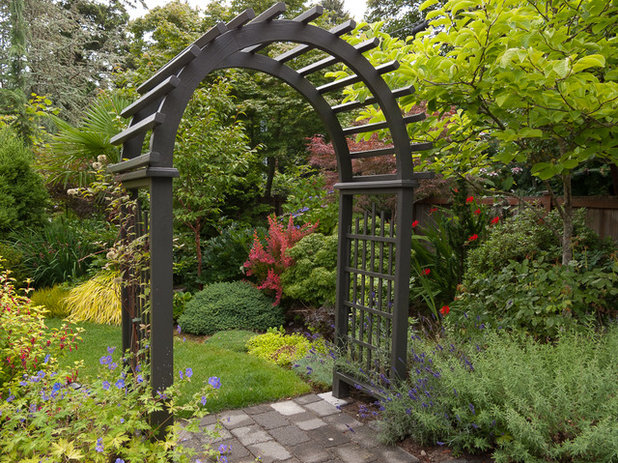
Le jardinet
The first tier comes from a selection of trees that add height, structure, color and winter interest. The three shown in this combination all offer something unique: fragrant flowers, interesting bark or exceptional foliage.
Midheight shrubs and grasses are included next, repeating the colors suggested by the trees but introducing new shapes: an upright barberry and a mounding conifer and grass. These provide a pleasing contrast to the wider canopies of the trees.
Finally just a few flowering plants act as accents to celebrate the season.
As your guests glimpse this enchanting scene through the archway, their curiosity will be piqued, enticing them to join you on a memorable garden journey.
Here’s how to get the look.
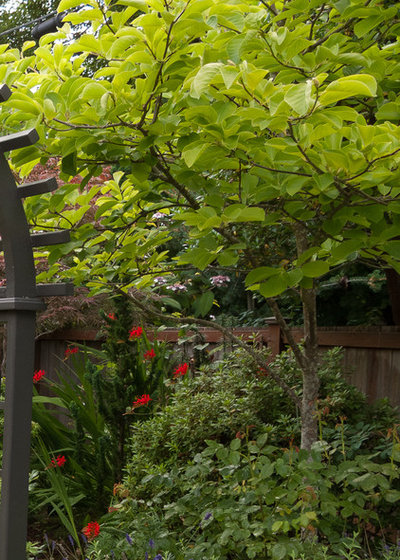
Le jardinet
1. Establish height with trees.
Yulan Magnolia (
Magnolia denudata)
This ancient tree, which dates back to the Tang Dynasty, is known as Jade Lily in China by virtue of its exquisite white lily-like blooms that appear before the leaves emerge.
Origin: Native to China and introduced into England in 1780
Where it will grow: Hardy to -10 degrees Fahrenheit (USDA zones 6 to 9; find your zone)
Water requirement: Average
Light requirement: Full sun to partial shade
Mature size: 30 to 40 feet tall and wide
When to plant: Spring or fall
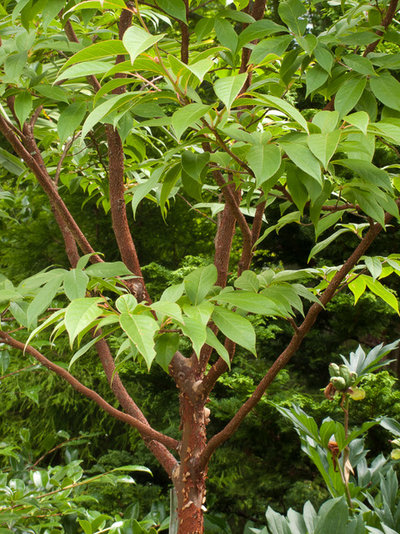
Le jardinet
Chinese Stewartia(
Stewartia sinensis)
This small tree has it all — beautiful bark for winter interest, white, fragrant camellia-like blooms in summer and vivid red fall color. The smooth bark of the Chinese stewartia is noted for its mottled appearance, which is revealed as sheets as the outer layers peel away. Plant this beauty in an area with protection from strong winds and late frosts.
Origin: Asia
Where it will grow: Hardy to -10 degrees Fahrenheit (zones 6 to 9)
Water requirement: Average to moist soil
Light requirement: Sun or partial shade
Mature size: To 25 feet tall and 15 feet wide
When to plant: Spring or fall
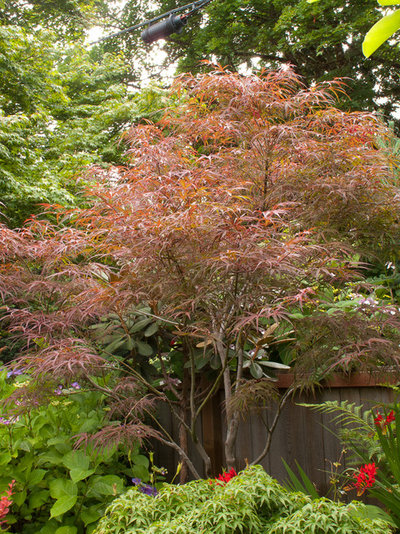
Le jardinet
Red Spider Japanese Maple(
Acer palmatum ‘Red Spider’; syn.
Acer palmatum ‘Beni kumo-no-su’)
Delicate spider-like leaves are the highlight of this small Japanese maple; they emerge red and mature to a bronze-green before turning to vivid scarlet in fall.
Origin: Canada
Where it will grow: Hardy to -20 degrees Fahrenheit (zones 5 to 8)
Water requirement: Average
Light requirement: Full sun or partial shade
Mature size: 6 feet tall and 3 feet wide in 10 years
When to plant: Spring or fall
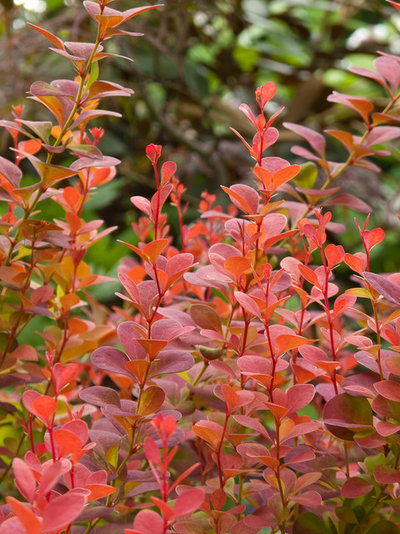
Le jardinet
2. Layer in shrubs and grasses.
Orange Rocket Barberry(
Berberis thunbergii ‘Orange Rocket’)
In a tapestry of green, blue and gold, this bold splash of ruby foliage is a welcome punctuation point from spring until fall.
Orange Rocket is a relatively new introduction, noted for its upright growth habit and striking color; it turns to fiery shades of orange and red in fall.
Origin: Garden hybrid
Where it will grow: Hardy to -30 degrees Fahrenheit (zones 4 to 9)
Water requirement: Low
Light requirement: Full sun
Mature size: 4 feet tall and 2 feet wide
Benefits and tolerances: Deer and rabbit resistant; drought tolerant
When to plant: Spring or fall
Note: Check with your local cooperative extension or county extension office before planting to see if barberry is considered invasive where you live.
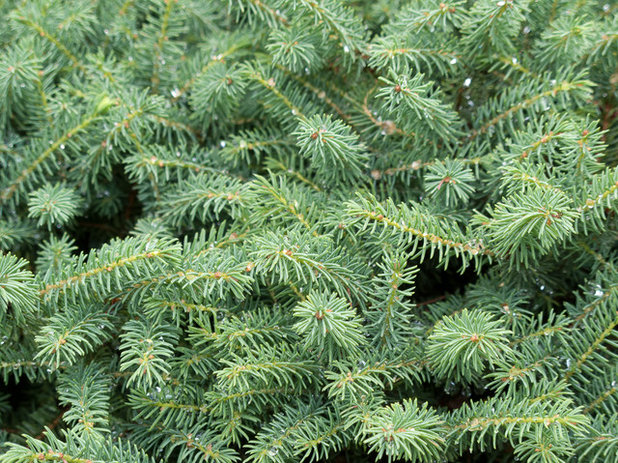
Le jardinet
Blue Nest Spruce(
Picea mariana ‘Ericoides’)
The unusual blue-gray needled foliage is what sets this spruce apart from the rest. This easy-care densely branched and compact conifer has a depression in the middle like a nest (hence its name).
Blue nest spruce is slow growing and would be suitable as a specimen in a rock garden or at the front of a mixed border.
Origin: Garden hybrid
Where it will grow: Hardy to -40 degrees Fahrenheit (zones 3 to 7)
Water requirement: Average
Light requirement: Full sun
Mature size: 2 feet tall and 4 feet wide, but very slow growing
Benefits and tolerances: Deer and rabbit resistant; low maintenance
When to plant: Spring or fall
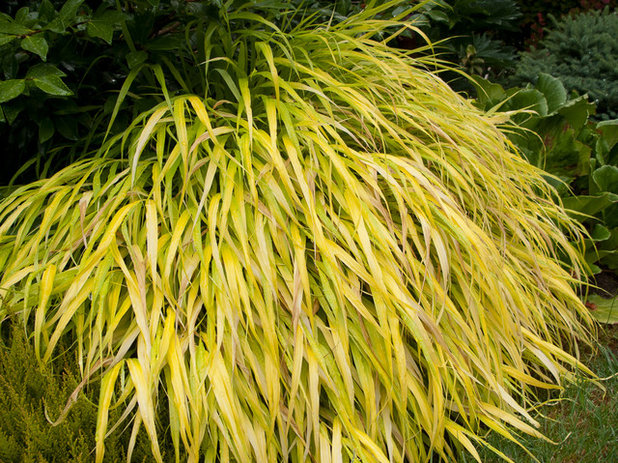
Le jardinet
All Gold Japanese Forest Grass(
Hakonechloa macra ‘All Gold’)
I have long been a fan of Japanese forest grass, which forms a soft waterfall of green and yellow variegated foliage from spring until fall. All Gold is very similar, but as the name suggests, it is a purely golden variety and as such is best suited to shady locations; it scorches in full sun.
Origin: While the species is native to Japan, this cultivar is a garden hybrid.
Where it will grow: Hardy to -30 degrees Fahrenheit (zones 4 to 9)
Water requirement: Average to moist
Light requirement: Protection from afternoon sun
Mature size: 18 inches tall and wide
Benefits and tolerances: Deer resistant
When to plant: Spring or fall
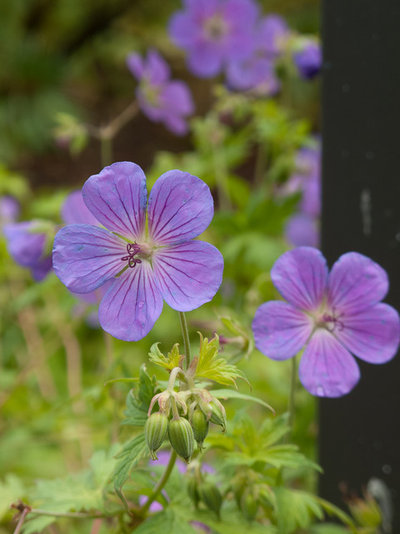
Le jardinet
3. Add flowers that have great foliage.Blue Sunrise Hardy Geranium (syn. Cranesbill)
(
Geranium ‘Blue Sunrise’)
Blue Sunrise wins a place on my plant wish list, not because of its flowers but because of its unusual chartreuse leaves, which continue to add color to the garden long after the early-summer blooms have gone. This attractive cultivar has a similar weaving habit to Rozanne, throwing out tendrils that mingle with adjacent plants
Origin: Garden hybrid
Where it will grow: Hardy to -20 degrees Fahrenheit (zones 5 to 8)
Water requirement: Average to moist
Light requirement: Full sun to partial shade
Mature size: 2 feet tall and up to 4 feet wide, but can be trimmed back in midsummer to keep it more compact
Benefits and tolerances: Low maintenance; usually deer and rabbit resistant; attracts bees and butterflies
When to plant: Spring or fall
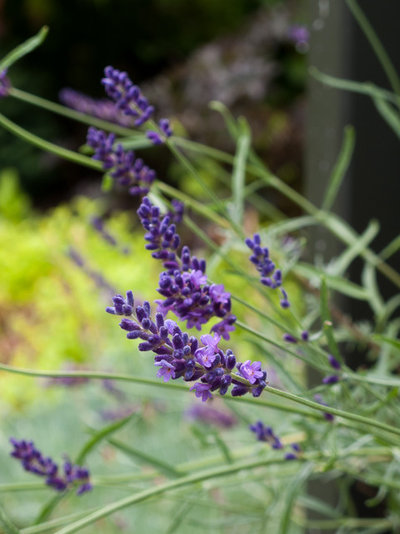
Le jardinet
Hidcote Lavender(
Lavandula angustifolia ‘Hidcote’)
Despite there being so many lavenders available to us today, Hidcote remains a favorite for its compact habit and deep blue summer flowers.
Lavender is perfect for lining pathways where its fragrance can be enjoyed daily. It is also effective as a low hedge, as a container plant or as part of a mixed border design, especially since its gray-green foliage remains year-round.
Origin: The species is native to the Mediterranean, but Hidcote was hybridized at Hidcote Manor in England.
Where it will grow: Hardy to -20 degrees Fahrenheit (zones 5 to 9)
Water requirement: Low
Light requirement: Full sun
Mature size: 2 feet tall and wide
Benefits and tolerances: Deer and rabbit resistant; attracts butterflies and bees; fragrant; drought tolerant
When to plant: Spring or fall
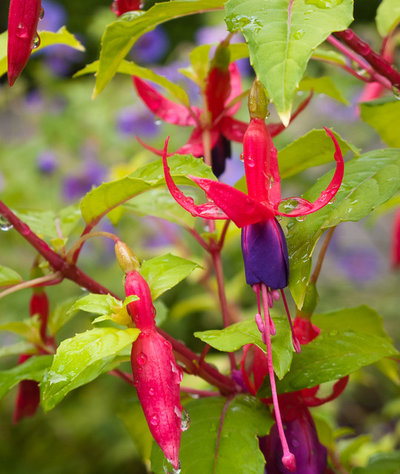
Le jardinet
Hardy Fuchsia(
Fuchsia ‘Genii’)
I love this fuchsia for its electric color palette that truly lights up a shade garden. Bold golden foliage is the perfect foil for the hot-pink and rich purple flowers that dangle from the branches all summer — a siren to hummingbirds.
Origin: Garden hybrid
Where it will grow: Hardy to 0 degrees Fahrenheit (zones 7 to 9)
Water requirement: Moisture-retentive soil
Light requirement: Partial shade
Mature size: 4 feet tall and wide
Benefits and tolerances: Attracts hummingbirds
When to plant: Spring or fall
See more planting ideas





